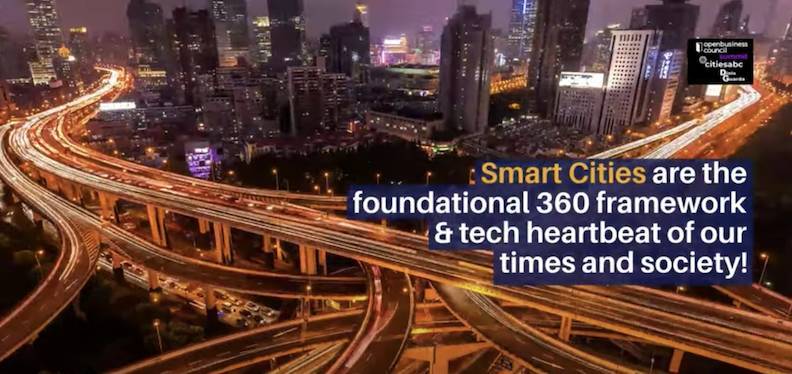Can Smart Cities Build A Smarter Society?
The world’s top 600 cities are expected to account for 60 percent of global GDP by 2025. source McKinsey. Can Smart Cities Build A Smarter Society? Smart Cities are the foundational 360 framework & tech heartbeat of our times and society!
Smart Cities is a concept and approach towards the present of cities has long been seen as a crucial tool for managing explosive population growth in urban areas of the global cities.
According to the UN Department for Economic and Social Affairs, more than half of the world’s population lives in towns & cities, a figure that could climb to close to 68 percent by 2050.
What is a “smart” society?
A smart society is one where 4IR digital transformation tech, thoughtfully deployed by governments, can improve on 3 broad outcomes:
1. The 360 well-being and wellness of citizens;
2. The strength of the economy & businesses.
3. The effectiveness of institutions, organisations & policies.
Can Smart Cities Build A Smarter Society? A Smarter Society needs Smart cities! No doubt!
What are the advantages of smart cities?
1. More effective, sustainable digital twins data-driven decision-making.
2. Enhanced balanced SDG ESG citizen and government engagement.
3. Safer and aligned communities.
4. Reduced environmental footprint.
5. Improved transportation and mobility.
6. Increased digital equity – digital empowerment and inclusion.
7. Economic and optimised business development.
8. Efficient public utilities.
Smart city developments like: Singapore, London, Tokyo, Amsterdam, Tel Aviv, NEOM in Saudi Arabia and Masdar in Abu Dhabi, have shown that the overal advantages of smart cities technologies are now full available.
Smart cities solutions can improve the full efficiency of cities, reduce running costs, improve livability and cut resource consumption and improve sustainability and 360 supply chain, energy and service delivery.
However legacy systems and retrofitting existing neighbooods urban infrastructures —as opposed to building new smart cities from the ground up—is and has been the major challenge.
Smart cities require strong ethics around policies, digital inclusion, data – IoT, blockchain and AI thoughtful integrations!
COVID-19 impact on cities economies, communities and public health, is partly being the spark galvanising cities to overcome barriers and find creative, multi-disciplinary approaches to make smart cities principles the foundation of all long-term urban planning.
A Smart society is now making the flights of imagination from science-fiction writers, filmmakers, and techno-futurists flying cars and teleportation real, and smart cities technology is making inroads in a piecemeal fashion as we speak with smart cities.
In NY, Cityzenith, a tech company helps city governments and businesses make sense of their data with digital twins tech.
In Minas Gerais Brazil, EvShare works on blockchain smart cities solutions for Zero Emission Micro-Transit services for Disadvantaged Communities, Sustainability, Carbon footprint, self development vehicles…
Organisations like the World Smart Cities Forum are creating an inclusive, tech-oriented system through the Smart City Master Planning and TechSandbox being deployed in Vietnam, Hanoi and Ukraine among other countries.
Smart Society is neither about “smartness” nor the technology to be deployed is the end goal.
A smart society ought to be defined by a framework that is based on outcomes. Its building blocks are what governments, citizens and policy makers aim to provide collectively. The technology is just a way to get there.
We will have a smarter society with smart cities if we align all efforts between all areas of society and use smart cities frameworks and tech to serve citizens.

Can Smart Cities Build A Smarter Society?
Citizens/People Components:
1. Social impact -inclusivity;
2. Environment, sustainability, governance ESG and quality of life;
3. State of talent and the human condition;
4. People talent development.
Economy Components:
1. global local connectedness;
2. economic business open innovation robustness,
3. entrepreneurial with universities ecosystem,
4. innovation and creativity capacity.
Institutions Components:
1. Freedoms and ethical thoughtful offline and online,
2. general trust,
3. safety, mobility and security,
4. efficiency of public services and infrastructure.
“Man is by nature a social animal; an individual who is unsocial naturally and not accidentally is either beneath our notice or more than human. Society is something that precedes the individual.
Aristotles
A smarter society needs smart cities and smarter strategies and moving targets of creativity, ethics, digital DNA and thourough ethics and action data driven continuos social change management.
Being smart is a moving target. Smart cities can make a smarter society but that requires to 360 keep on moving!
“All mankind is divided into three classes: those that are immovable, those that are movable, and those that move.”
Benjamin Franklin
We are a digital society becoming a smarter society.
Smart cities are the framework that can make it happen!

Dinis Guarda is an author, academic, influencer, serial entrepreneur, and leader in 4IR, AI, Fintech, digital transformation, and Blockchain. Dinis has created various companies such as Ztudium tech platform; founder of global digital platform directory openbusinesscouncil.org; digital transformation platform to empower, guide and index cities citiesabc.com and fashion technology platform fashionabc.org. He is also the publisher of intelligenthq.com, hedgethink.com and tradersdna.com. He has been working with the likes of UN / UNITAR, UNESCO, European Space Agency, Davos WEF, Philips, Saxo Bank, Mastercard, Barclays, and governments all over the world.
With over two decades of experience in international business, C-level positions, and digital transformation, Dinis has worked with new tech, cryptocurrencies, driven ICOs, regulation, compliance, and legal international processes, and has created a bank, and been involved in the inception of some of the top 100 digital currencies.
He creates and helps build ventures focused on global growth, 360 digital strategies, sustainable innovation, Blockchain, Fintech, AI and new emerging business models such as ICOs / tokenomics.
Dinis is the founder/CEO of ztudium that manages blocksdna / lifesdna. These products and platforms offer multiple AI P2P, fintech, blockchain, search engine and PaaS solutions in consumer wellness healthcare and life style with a global team of experts and universities.
He is the founder of coinsdna a new swiss regulated, Swiss based, institutional grade token and cryptocurrencies blockchain exchange. He is founder of DragonBloc a blockchain, AI, Fintech fund and co-founder of Freedomee project.
Dinis is the author of various books. He has published different books such “4IR AI Blockchain Fintech IoT Reinventing a Nation”, “How Businesses and Governments can Prosper with Fintech, Blockchain and AI?”, also the bigger case study and book (400 pages) “Blockchain, AI and Crypto Economics – The Next Tsunami?” last the “Tokenomics and ICOs – How to be good at the new digital world of finance / Crypto” was launched in 2018.
Some of the companies Dinis created or has been involved have reached over 1 USD billions in valuation. Dinis has advised and was responsible for some top financial organisations, 100 cryptocurrencies worldwide and Fortune 500 companies.
Dinis is involved as a strategist, board member and advisor with the payments, lifestyle, blockchain reward community app Glance technologies, for whom he built the blockchain messaging / payment / loyalty software Blockimpact, the seminal Hyperloop Transportations project, Kora, and blockchain cybersecurity Privus.
He is listed in various global fintech, blockchain, AI, social media industry top lists as an influencer in position top 10/20 within 100 rankings: such as Top People In Blockchain | Cointelegraph https://top.cointelegraph.com/ and https://cryptoweekly.co/100/ .
Between 2014 and 2015 he was involved in creating a fabbanking.com a digital bank between Asia and Africa as Chief Commercial Officer and Marketing Officer responsible for all legal, tech and business development. Between 2009 and 2010 he was the founder of one of the world first fintech, social trading platforms tradingfloor.com for Saxo Bank.
He is a shareholder of the fintech social money transfer app Moneymailme and math edutech gamification children’s app Gozoa.
He has been a lecturer at Copenhagen Business School, Groupe INSEEC/Monaco University and other leading world universities.





























